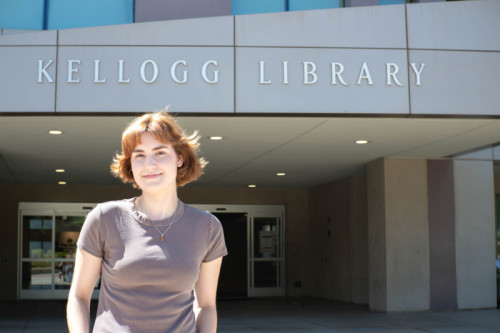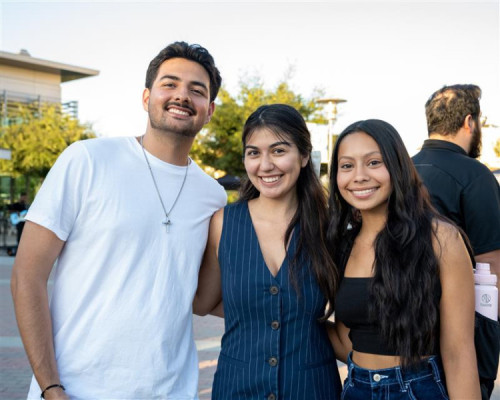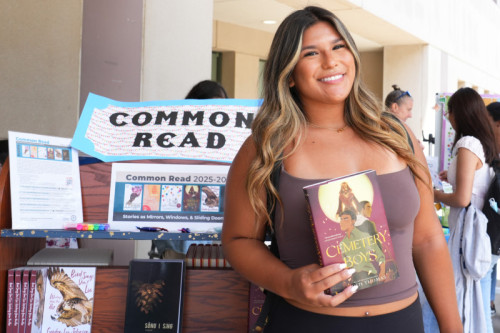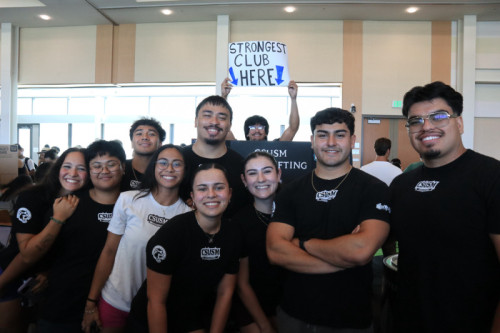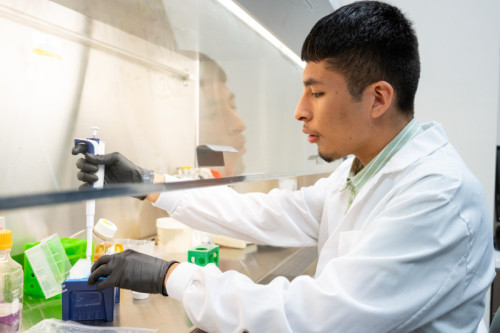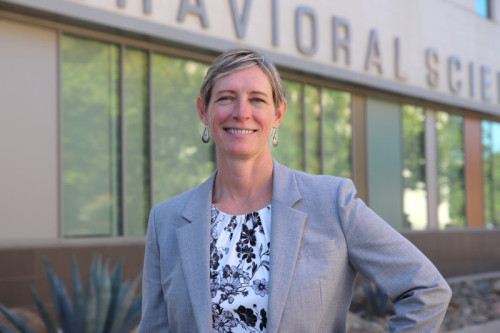Alumna on Front Lines of Fight to Advance Clean Energy
Manal Yamout McDermid often feels like sheâs standing on the cutting edge of Californiaâs multibillion-dollar green economy.
One day, McDermid will be meeting with a company that is developing what are effectively electric helicopters designed to cover distances of less than 100 miles â basically, an Uber for the skies. The next day, sheâll sit down with a business thatâs building a device that captures a semi truckâs carbon emissions directly from the tailpipe, pumps it into a tank, then either buries it underground or sells the CO2 for use in products like soda.
Still other days might include huddles with firms that make rooftop solar panels, heat pump water heaters, even self-driving cars.
âEach of the clients that I work with, I get a chance to embed in their team,â McDermid said. âI get to jump around. And not only is the subject matter different, but the people are different and the vibe is different. I like that diversity.â
Those clients, in turn, value McDermidâs expertise, so much so that theyâre willing to pay handsomely for it, in many cases while theyâre still trying to get off the ground as a startup. The Cal State San Marcos alumna is the founding partner of Caliber Strategies, a Sacramento-based lobbying firm that helps energy and climate companies â whether sexy startups or stodgy utilities â navigate the regulatory maze that is the California policy arena.
In doing so, McDermid draws on almost two decades of experience in state politics and policymaking, going back to when she was a clean energy adviser to former Gov. Arnold Schwarzenegger in her early 20s, only a few years after graduating from CSUSM with a degree in biology.
âI founded this company because itâs really challenging to bring new technologies to market, especially in a place like California where the market rules are quite complex and there are all these different agencies doing different things,â McDermid said. âWe focus exclusively on climate and energy, and primarily on what I refer to as disruptive technologies.â
Founded in 2013, Caliber now totals eight employees, and one of McDermidâs fellow partners is Michael Picker, former president of the California Public Utilities Commission (CPUC), the nonpartisan body charged with regulating the stateâs utilities. The company has almost 50 clients, including investment management giant Blackstone, accounting firm KPMG and Sunrun, one of the nationâs biggest solar installers.
Sometimes Caliberâs clients take the form of a legacy company thatâs opening a new product line. A.O. Smith Corporation, for example, has been around for 150 years and is one of the worldâs leading manufacturers of water heaters and boilers, with annual sales of almost $4 billion. But as California increasingly moves toward the full electrification of all buildings, A.O. Smith is gravitating toward heat pumps, which heat water using electricity instead of gas.
Enter Caliber. The company worked with a team of nonprofit, industry and environmental organizations to help pass legislation to allocate about $44 million in incentives for heat pumps. Caliber then led an effort with this coalition and the CPUC to design an incentive program that would offer state residents payments of up to $7,300 for installing heat pumps.
Another category of clients is fledgling businesses with an innovative solution to a climate-related problem. Charm Industrial is a Bay Area startup with a mission to, as its website touts, âput oil back underground,â an elegantly simple description of the complex science involved in carbon capture and sequestration. Charm approached Caliber in its infancy, seeking to get introduced to the right people, increase its name recognition and create a market from scratch.
âItâs about streamlining the process, and even more so trying to educate regulators,â McDermid said. âWe educate regulators and policymakers about what the needs of new technologies are. After the policymaker has already said, for example, we want electric cars and you have the market ready, there remain all these barriers that no one has figured out. So itâs a collaborative process to figure out how we get from where we are now to where we want to be.â
It was at CSUSM where McDermid discovered her twin passions for environmental science and public policy. Having initially enrolled at the university on a cross country and track and field scholarship (she competed for two years before injuries forced her to stop), she decided she wanted to pursue conservation biology and save the earth one planted tree at a time.
At some point in her college journey, however, it dawned on her that planting trees â even 10 to 20 acres worth â couldnât compare with, say, protecting millions of acres through legislation. As a junior, McDermid spent the fall semester in Washington, D.C., as part of the Panetta Congressional Internship Program, and when she returned, she ran for and was elected president of Associated Students, Inc., for her senior year in 2004-05. She even started a progressive activist organization with some friends.
âCSUSM was this perfect testing ground to try out all these different things,â she said.
Using her student experience as a springboard, McDermid was accepted after graduation into the Capital Fellows Program, an initiative through Sacramento State that offers paid, full-time fellowships in each branch of Californiaâs government. She was assigned to Gov. Schwarzeneggerâs office for a year, followed by a year working in the office of First Lady Maria Shriver.
In 2008, McDermid got her big break when Susan Kennedy, still early in her tenure as Schwarzeneggerâs chief of staff, acted on a recommendation to tap McDermid as her top deputy. Kennedy was seeking not an executive assistant but someone who could step into her high-pressure position when necessary and not miss a beat. In McDermid, she found a kindred spirit, essentially a younger version of herself.
âShe was perfect,â Kennedy said. âShe looked out at the landscape from the perspective of, if she were the chief of staff to the governor, how would you prepare for this? How would you brief him on this? What information do you need from the agencies or the departments or the senior staff?
âItâs a very tough role to step into, and she earned everyoneâs respect because she was so good at what she did. She made me twice as good at what I was doing because she was as good as me.â
Near the end of his eight years as governor, Schwarzenegger began to feel a particular urgency to buttress his accomplishments in the climate space. He tasked Kennedy with figuring out how to secure permitting for a host of renewable energy projects being incentivized by the Obama administration, and Kennedy in turn tasked not only Picker â the former CPUC president and current Caliber partner â but also McDermid.
âIt was a failure-is-not-an-option initiative by the governor,â Kennedy said. âI gave Michael all the power, and I gave him the most powerful weapon I could think of, which was Manal. The two of them were responsible for basically unlocking gigawatts of renewable energy in California, which completely changed the landscape of the stateâs climate initiatives.â
McDermidâs efforts were so successful that, when Schwarzenegger left office in 2011 and Jerry Brown entered, she was among just a handful of staffers retained out of the nearly 100 in the governorâs office. She departed later that year to take a job in Washington as a lobbyist for NextEra Energy, an electric utility holding giant, before Kennedy lured her back to California in 2013.
With her longtime mentor, McDermid launched not only Caliber but also Advanced Microgrid Solutions (AMS), a company that was born out of the shuttering of the San Onofre nuclear power station in June 2013. That closure created an immediate 20% power shortage in large portions of Los Angeles, a gap that AMS filled by building what McDermid called the âworldâs largest virtual power plantâ â battery storage systems at commercial sites like Kaiser Permanente, Irvine Company and Walmart. Over time, AMS shifted its focus from developing those large-scale energy storage projects to providing software that allowed others to optimize their own energy storage assets.
When AMS was sold in 2020, McDermid rededicated herself to Caliber, which had been on the back burner for a few years. During the pandemic, she got married and moved from San Diego (where she grew up after her family escaped war-torn Lebanon when she was 3) to Santa Barbara, her husbandâs hometown. Manal and Hitch, her husband, have a 3-year-old son, Malek.
McDermid makes frequent trips to Sacramento and to San Francisco, where Caliber has a small office. Not coincidentally, the Bay Area also is the headquarters of the CPUC, one of the regulatory bodies that Caliber works closely with, along with the California Energy Commission, the Air Resources Board and the Natural Resources Agency.
Many for-profit companies have an adversarial relationship with the regulators that establish the rules governing them, but thatâs not the case with Caliber or most of its clients. Theyâre all in the same boat and rowing in the same direction when it comes to the stateâs ambitious climate goals, which is one of myriad reasons why McDermid loves the work she does.
âWeâre very focused in California precisely because we actually want to get things done,â McDermid said. âI donât want to spend my time convincing someone that climate change is a problem or that we should put more electric vehicles on the roads. The nice thing about California is, at the highest level, the leadership is completely bought in on what the problem is. And itâs more about figuring out: How do we solve it?â
Manal Yamout McDermid
Major at CSUSM: Biology
Graduation year: 2005
Company: Caliber Strategies
Website: caliberstrat.com
Founded: 2013
Number of employees: 8
Talking Business With Manal Yamout McDermid
What's the best advice you received about starting a business?
Work with people you like. It's super simple, but if you pick people you like and admire and want to spend an inordinate amount of time with, you really can't go wrong. In some ways, getting the people right is more important than the idea and the path to market.
What advice would you give budding entrepreneurs?
Same advice as the first one: Choose your partners carefully, and choose them based on their character, their integrity and your level of trust in them. Donât just think about breaking into a market.
What's the greatest challenge in starting your own business?
I think it's the uncertainty and the self-doubt that come with it, like: Should I grow? The greatest challenge is believing that as you scale up, things will work out, and getting the confidence to take that next step.
Knowing what you know now, is there anything you would have done differently?
No. I'm a firm believer that whatever happens was supposed to happen, and it doesn't mean that it was good. But I wouldn't have done it differently.
What are the qualities of a good entrepreneur?
I would say confidence, belief in yourself. The ability to really pay attention to what's happening around you, whether that's the market or the people you surround yourself with.
Media Contact
Brian Hiro, Communications Specialist
bhiro@csusm.edu | Office: 760-750-7306
Latest Newsroom
- Scholarship Contender With Cystic Fibrosis ThrivingLola Ferguson was a regular at the hospital as a child. She was used to taking 50 pills a day, undergoing hours of treatments and numerous doctors’ appointments. It was just part of her normal daily life. “I was diagnosed with cystic fibrosis before I was even born,” Ferguson said. Also known as CF, cystic fibrosis is a genetic disorder that affects the body's mucus-producing glands, causing damage to the lungs, digestive system and other organs. Ferguson still takes medication and has treatments, but medical advances allow her to live a relatively normal life as a college student in her second year at Cal State San Marcos. In fact, Ferguson is doing so well that she is among the candidates for the AbbVie CF Scholarship, which honors students who are thriving with cystic fibrosis. Public voting accounts for about 30% of the evaluation. Supporters can vote online for Ferguson or by texting "VOTE23" to 35309 through Sept. 18. Winners will be announced Oct. 23. Other evaluation factors are based on academic record and extracurricular activities, an essay and a creative presentation. Ferguson received a $3,000 AbbVie scholarship last year and is hoping this year to win the top award, a $22,000 “Thriving Student Scholarship.” “AbbVie is a pharmaceutical company, and I have taken their meds in the past, so it was just sort of a household name for me,” Ferguson said. “To have a scholarship like that and be involved with a company like that is really nice.” In the late 1980s and early 1990s, the predicted survival age for people with cystic fibrosis was about 28 years old. Ferguson represents a new generation of young adults with CF who, thanks to medical advances, are living significantly longer. Life expectancy has improved to about 68, according to the Cystic Fibrosis Foundation. Ferguson has seen firsthand the improvements. The more than four dozen daily pills she took as a child is down to 20. She said CF primarily affects her lungs and digestive system, and she also has a mild case of diabetes related to it. In addition to the medication, she does an hour of daily treatment and closely watches her diet. “I don’t even drink caffeine,” she said. “I can’t miss out on my health because it’ll plummet really fast.” Ferguson has found a supportive environment at CSUSM. Disability Student Services ensured that she received a single room in campus housing, which was vital because of the daily treatment she requires. A literature and writing studies major, Ferguson was thrilled to land an on-campus job in Kellogg Library during her first year and she also started writing this fall for CSUSM’s student newspaper, “The Cougar Chronicle.” “I’ve learned to manage things and understand what I can and can’t do,” Ferguson said. “And I haven’t really had a problem in a long time because of all my treatments and medications.” Media Contact Eric Breier, Interim Assistant Director of Editorial and External Affairs ebreier@csusm.edu | Office: 760-750-7314
- CSUSM to Host Hispanic Heritage Month EventsIn celebration of National Hispanic Heritage Month, Cal State San Marcos’ Latinx Center is partnering with campus organizations to present an exciting lineup of events. The month, which runs Sept. 15-Oct. 15, is an opportunity to celebrate the rich culture and diverse backgrounds of Hispanic-identifying people. Everyone is invited to participate in Hispanic Heritage Month events. Chingona Fest Tuesday, Sept. 9 This two-part event celebrated and uplifted CSUSM's Latina-identifying students and their experiences. This year’s theme was Chingona Sin Frontiers, facing barriers in pursuit of education. Cafecito con Pan Monday, Sept. 15, noon, USU 3200 Kicking off the month, this series is hosted monthly in the Latinx Center, connecting students with professionals across campus and offering opportunities for conversations over coffee and pan dulce. Latinx Center’s 10th Birthday Party Wednesday, Sept. 17, noon, USU 3200 To celebrate the 10-year anniversary of the center, a birthday party will be hosted with games, cake and community. Raices de Barro: Talavera Workshop Tuesday, Sept. 23, noon, USU 3200 The Latinx Center will explore the roots of Mexican Talavera artwork and ceramics, with opportunities for students to create their own vase. Shared Roots: Tattoos in our Cultures with APIDA Thursday, Sept. 25, USU 3200 An ongoing series in collaboration with the APIDA Student Center explores the cultural significance of tattoos in both APIDA and Latine communities. Chisme Club: Sin Fronteras Thursday, Oct. 2, noon, USU 3200 Students are invited to reflect on the impact of current events on our communities, with a self-care activity to end the session. Latine Heritage Month Celebration Thursday, Oct. 9, 5 p.m., USU Ballroom Join us as we close out Latine Heritage Month with music, food and games at a celebration open to all. Media Contact Eric Breier, Interim Assistant Director of Editorial and External Affairs ebreier@csusm.edu | Office: 760-750-7314
- New Common Read Theme Focuses on Empathy, Lived ExperiencesAfter three years of focusing on banned books, Cal State San Marcos’ Common Read will highlight stories that broaden perspectives and build empathy, according to CSUSM Academic Transitions Librarian Allison Carr. The theme for 2025-26, “Stories as Mirrors, Windows & Sliding Doors,” uses fiction and nonfiction books to provide insight into different lived experiences and encourages compassion and understanding. Students can pick up a free copy of a Common Read book from noon to 1 p.m. on the following dates: Sept. 18, Oct. 16, Nov. 13 and Dec. 4, in front of Kellogg Library. “We loved the banned books theme and we heard from a lot of students that they loved it, too. But after three years, we wanted to move on to a broader theme that reflected the current climate,” Carr said. “Given what we’ve seen in the news lately about a decline in reading, along with what we know about how reading encourages empathy and compassion, it was important that students gain a deeper understanding of people from all backgrounds.” Carr explained that Common Read considers the diversity of authors and genres as well as the interests of topics to undergraduate students when selecting the books. “While I’m excited about all of our books, this is the first year we’ve offered a collection of poems, ‘Song I Sing’ by Bao Phi. His poems, which are about immigration, race and class, feel a lot more accessible because of his slam poetry background,” Carr said. The library’s Student Advisory Board selected “Cemetery Boys” by Aiden Thomas as one of the books to be included. The story features a trans boy proving himself to his Latinx family, while also featuring elements of a love story and a paranormal investigation. The complete list of books selected for this year’s campaign is: “Bird Songs Don't Lie,” Gordon Lee Johnson “Daytripper,” Fabio Moon “The Remember Balloons,” Jessie Oliveros “Song I Sing,” Bao Phi “The Cemetery Boys,” Aiden Thomas (students' choice) “The View From Down Here: Life as a Young Disabled Woman,” Lucy Webster “Stories can break stereotypes, increase awareness of systemic issues and encourage respectful interactions with people from different backgrounds,” Carr said. “At a time when empathy and compassion are seen as weaknesses, reading can help us build and sustain a community that's inclusive and addresses the inequities marginalized communities currently face.” Common Read is also offering a zine-making workshop in collaboration with the Context Exhibit Series, “Zine Dreams” from 1-2 p.m. on Oct. 9 at The Makery. At the event, students can create a page in a collective zine that highlights their identities and stories. An RSVP is required. “My hope for this year is that students gain a deeper understanding of people who are different from them, but also a great understanding of themselves,” Carr said. Media Contact Eric Breier, Interim Assistant Director of Editorial and External Affairs ebreier@csusm.edu | Office: 760-750-7314
- Photo Highlights From Student Org FairCal State San Marcos welcomed hundreds of students to the University Student Ballroom on Sept. 4 for the annual Student Organization Fair. The event provides students an opportunity to learn about the many ways to get involved on campus. With more than 100 recognized student organizations in a variety of categories, there is something for everyone. Relive some of the event highlights in the Student Org Fair photo slideshow. To learn more about available student organizations, visit the student organization directory. Media Contact Eric Breier, Interim Assistant Director of Editorial and External Affairs ebreier@csusm.edu | Office: 760-750-7314
- Higher Ed Proves Transformational for Award RecipientOscar Loyola Torres never wanted to become a doctor until he saw a sheep's brain. Growing up, Loyola Torres was interested in filmmaking and acting. But he found himself gravitating toward the medical field after taking anatomy and a biomedical elective course at San Marcos High School (it was in the latter class that he saw the sheep’s brain). Loyola Torres, a molecular and cellular biology major at Cal State San Marcos, is the first person in his family to attend college. Elementary school teachers told him that there would be a spot for him at CSUSM when the time came, thanks to CSUSM's K-12 Alliance, which motivated him to work hard from an early age. Loyola Torres’ efforts paid off, as he was honored recently as CSUSM’s recipient of the 2025 CSU Trustees’ Award for Outstanding Achievement, California State University’s highest recognition of student accomplishment. The CSU recognizes 23 students every year – one from each campus – with the Trustees’ Award. Students are selected based on academic achievements, financial need, excellence in community service and personal hardship. Awardees have all demonstrated inspirational resolve along the path to college success, and many are the first in their families to attend college. “It's almost like imposter syndrome,” Loyola Torres said. “It was just an honor to receive the nomination.” Loyola Torres’ decision to attend CSUSM over other universities, including UC Riverside, was based on community and affordability. It was a place where he could be close to home while affording school, and his parents supported his decision. “My parents weren’t able to pursue higher education, so that motivated me,” Loyola Torres said. “I have the privilege of pursuing it, so I have always planned on it.” As a Pathmaker intern at Palomar Medical Center Escondido, Loyola Torres saw the language barriers that Spanish-speaking patients often experience in health care. “I have the privilege of speaking both English and Spanish,” he said. “A lot of the patients struggle with understanding what the doctors are saying. I'm going to be able to almost close that gap in the language barrier.” Loyola Torres also serves in CSUSM's COMPASS research internship, which recruits local high school students and trains them in stem cell science. Expanding hands-on learning opportunities through internships like this is one of the goals of CSUSM’s recently launched “Blueprint for the Future” fundraising campaign. Research and industry partnerships are a key part of how the university prepares students such as Loyola Torres to thrive in the workforce. Loyola Torres works in biology professor Carlos Luna Lopez’s lab, studying breast cancer cells. Along with a master’s student, Loyola Torres investigates cell culture and how breast cancer cells grow. This fall, Loyola Torres will serve as president of the campus’ MedLife club, which aims to combat health care shortages and help increase essential health care services to low-income communities in Latin America and Africa. He calls it one of his biggest accomplishments. Reflecting on his journey, Loyola Torres is proud of his growth. From entering his first year as a quiet student to working internships, serving as a club president and being nominated for an award, he is thankful for these opportunities. “My GEL professor freshman year told me I have to be comfortable with the uncomfortable,” Loyola Torres said. “I'm proud of myself, because I don't know what I would have been doing right now if I didn't open up or didn't receive that advice." Media Contact Eric Breier, Interim Assistant Director of Editorial and External Affairs ebreier@csusm.edu | Office: 760-750-7314
- New CHABSS Tenure-Track Faculty Drawn to CSUSM for Myriad ReasonsTeaching in a student population environment of around 2,500 and then moving to one with 17,000-plus is one of the many challenges that Roni Kay O’Dell, a new assistant professor of political science and global affairs, has signed up for this semester. “I’m really impressed with high student participation in my classes,” said O’Dell, who is particularly moved by the contributions of her global governance class, which is essentially an introduction to international relations. “I’m really excited that the students are so interested in the subject matter. We’ve also already had some really good conversations about current events that are happening in my environmental politics class, which is called Green Planet Politics.” O’Dell is one of four newly hired tenure-track faculty in the College of Humanities, Arts, Behavioral and Social Sciences. She is spending this week at the University of Bradford in the United Kingdom at the Human Development and Capability Association Conference, where she will present her research on how humans can agree on sustainable use and management of Earth’s resources. O’Dell is also a board member (director at large) for the organization. O’Dell comes to CSUSM from Seton Hill University, a Catholic liberal arts university in Greensburg, Pa. There, she was program coordinator (essentially the chair) of the political science and global studies program, led the Model United Nations program and was the adviser for the Pi Sigma Alpha National Political Science Honor Society chapter. In addition to the larger student population here, another adjustment she has enjoyed is the change in lifestyle. Along with her husband and dog, O’Dell already has basked in beach days and local hikes, including traversing Torrey Pines recently. “There are a lot of wonderful things about where I’ve lived before, but there’s nothing like being able to go for a walk by the ocean so easily, or be on the beach or even do some of the hikes around here and enjoy the beautiful views,” said O’Dell, who grew up in Montana and earned a bachelor’s degree from the University of Washington, a master’s from the Middlebury Institute of International Studies at Monterey and a Ph.D. from the University of Denver. O’Dell is not unlike many CSUSM students. She was the first in her family to graduate from college, beginning that journey at the community college level. Social mobility was a crucial part of her path, so she’s excited to help guide students here by utilizing the same tools of hard work and a caring support system. “I know that CSUSM has that amazing opportunity for students, and so many people who come here are the first people in their family who have gone to a college or are thinking about a university degree or thinking about expanding what they want to do with their lives,” she said. “That was one of the things that definitely drew me.” O’Dell wants to support students to learn and practice how to protect the environment. Essentially, how to make sure humans can thrive while also utilizing our resources sustainably. Putting the theoretical into practice. “There are so many ways CSUSM focuses on sustainability, on the concern for the environment,” she said. “That’s deeply connected to my study of public policy, my study of international relations – my academic interests and research interests, but also practical interests. So that’s really exciting.” Hyunjin Koo Hyunjin Koo is an assistant professor in the department of psychological science. She earned a Ph.D. in social psychology from UC Irvine and worked as a postdoctoral research associate at the University of British Columbia before joining CSUSM. As a social psychologist, Koo has two main research programs. First, her work examines how experiences and beliefs about socioeconomic mobility shape everyday thoughts and behaviors, including attitudes toward work and leisure, views of the rich and poor, perceptions of inequality, morality, and social class. Second, in an emerging line of research, she studies a novel psychological construct that she and her team have introduced – leisure guilt — which refers to the guilt people feel when taking leisure time instead of being productive. Her research explores the antecedents and consequences of leisure guilt, as well as the cultural and social factors that influence it. What drew you to CSUSM? Koo: I was drawn to CSUSM for its strong commitment to student success and social mobility. My main research interest is social mobility, so I was excited to find that my work aligns perfectly with the university’s mission and goals. What are you hoping your students will take away from your classes? Koo: I hope that through my classes, students come to see how psychology connects to many aspects of their daily lives and experiences, and that they discover the joy of engaging with psychological topics. What is one of your professional goals you hope to accomplish while you’re here? Koo: I want to embody the teacher–scholar model. My goal is to be both a strong researcher and a dedicated teacher who helps students achieve their own success. What is your favorite activity during your downtime? Koo: In my free time, I enjoy exploring new coffee shops and restaurants and finding new favorites. I’m especially excited that San Diego has so many places to discover! Kiana Maillet Kiana Maillet is an assistant professor in the American Indian studies department and is a member of the Lone Pine Paiute-Shoshone Tribe. She is a double CSUSM alumna and a licensed clinical social worker with multiple certifications, and she has extensive volunteer and job experience working with youth, families and communities. Her research interests include American Indian experiences within systems such as foster care, schools and mental health, as well as traditional teachings and experiences with language, foods, plants, places and ceremony. What drew you to CSUSM? Maillet: I went through the Master of Social Work and the joint doctoral programs at CSUSM and have been a lecturer here for several years in the AIS department. What are you hoping your students will take away from your classes? Maillet: I hope that students will learn about the beauty and complexity of Native ways of being – our side of history, science, mental health, ecology, language, the real impacts of colonization and the strength and resilience of our people. What is one of your professional goals you hope to accomplish while you’re here? Maillet: I hope to not only share my knowledge, but also to continue to grow and learn myself. I want to be able to make a positive impact on our students, our campus and in our communities. What is your favorite activity during your down time? Maillet: I enjoy hiking, gardening, playing with my grandsons and attending our Nüümü Yadoha (Paiute language) classes. Carlos Rosas Carlos Rosas is a new assistant professor in the psychological science department. He’s also no stranger to campus. Rosas earned a bachelor’s degree in psychology from CSUSM and a Ph.D. in psychology with a concentration in community and prevention research from the University of Illinois Chicago. Rosas completed epidemiology-focused postdoctoral fellowships at UC San Diego and San Diego State. For the past two years, he also has taught various classes as a lecturer at CSUSM. His research program integrates social and health psychology theories, epidemiological methods, and community-based participatory research approaches to examine the social, cultural and psychological drivers/determinants of mental and physical health (particularly in the context of chronic disease prevention and management), and to develop, implement and evaluate culturally informed and tailored, community-based interventions to promote healthy behaviors and mitigate risk factors. His research places special emphasis on communities of color and other historically understudied populations. Rosas regularly teaches multicultural perspectives in psychology, social psychology and statistics in psychology. What drew you to CSUSM? Rosas: CSUSM is my alma mater. As an undergraduate, I found CSUSM to be an incredibly supportive and intellectually nurturing academic home. The encouragement and guidance I received from the psychology faculty were quite literally life-changing. I would not have pursued a doctoral degree without their unwavering support and mentorship. Hence, returning to CSUSM was the natural choice for me, and I'm really excited for the opportunity to provide my own students with the same support, motivation and inspiration that I once received from my own professors. What are you hoping your students will take away from your classes? Rosas: I want my students to leave my classes inspired. In particular, I hope students from low-income and historically underrepresented backgrounds see that it is possible for people like us – the first in our families to attend college, from working-class families, etc. – to move up the socioeconomic ladder and pursue careers that often seem inaccessible. I also want to instill in my students a passion for psychology and psychological research. I still remember walking out of my first social psychology class in awe of the studies we had learned about, and I hope my students leave my classes with that same sense of wonder and curiosity. What is one of your professional goals you hope to accomplish while you’re here? Rosas: I'm looking forward to establishing partnerships with local community organizations and clinics to collaborate on research projects that improve the health and well-being of underserved communities. What is your favorite activity during your down time? Rosas: I enjoy working out, primarily lifting weights, though I also like to add a cardio session from time to time. Media Contact Eric Breier, Interim Assistant Director of Editorial and External Affairs ebreier@csusm.edu | Office: 760-750-7314








